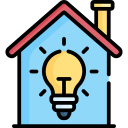
Impact of AI and IoT on Future Smart Homes
The rapid evolution of Artificial Intelligence (AI) and the Internet of Things (IoT) is fundamentally reshaping the concept of smart homes. Merging these technologies allows for unprecedented levels of automation, personalization, and efficiency within residential spaces. As AI algorithms grow more sophisticated and IoT devices become more interconnected, the future smart home is destined to provide not only enhanced convenience and energy savings but also improved security and health monitoring. This page explores the transformative impacts and potential of AI and IoT on the way we live, interact, and manage our living environments.
Seamless Interconnectivity for Daily Convenience
The fusion of AI and IoT ensures that a myriad of devices—from thermostats to kitchen appliances—communicate and coordinate for effortless living. For example, your security camera can talk to the lighting system, adjusting illumination when motion is detected, while the AI learns and refines light settings based on time of day and occupancy patterns. As more devices become part of this ecosystem, homes can execute complex routines tailored to residents’ individual schedules. The result is an environment that is not merely reactive but anticipatory, where comfort and productivity are optimized with minimal human intervention.
Enhanced Personalization Through Machine Learning
AI-powered systems can analyze vast streams of data from IoT devices to learn about individuals’ preferences, routines, and habits. Over time, these insights empower the smart home to personalize nearly every aspect of living—from temperature settings and light intensity to content recommendations on entertainment systems. In the future, homes will not only obey voice commands but also predict users’ needs, offering gentle reminders or adjusting resources automatically. This ongoing refinement transforms the home into a responsive companion, seamlessly adapting to lifestyle changes.
Integrating Home Management Under One Umbrella
One of the most powerful impacts of AI and IoT integration is the consolidation of home management. Traditionally, homeowners have dealt with discrete systems for security, energy, and entertainment. Now, integrated platforms driven by AI can provide a unified dashboard that centralizes control and monitoring. The result is greater visibility into usage and performance, streamlined maintenance, and the opportunity to optimize every aspect of the home. As interfaces become more intuitive, even complex functions will be accessible to all age groups, simplifying the homeowner’s experience across the board.
Transforming Energy Efficiency and Sustainability
Real-Time Energy Management and Savings
Future smart homes equipped with AI-driven IoT devices can continuously track electricity, water, and gas consumption at a granular level. By analyzing this data, AI can predict peak times and adjust usage accordingly—dimming lights, lowering heating, or shutting off appliances when not needed. Intelligent systems can even tap into renewable sources like solar panels, determining when to store energy or feed it back into the grid. Over time, these optimizations translate to significant cost savings and reduced environmental impact while maintaining a comfortable interior climate.
Automated Resource Allocation for Greener Living
Advanced sensors and machine learning models can allocate resources precisely where and when they are needed. For instance, irrigation systems can assess soil moisture and local weather forecasts to deliver water only when truly required. Kitchen appliances can operate during times of low energy tariffs, and ventilation systems can adjust airflow for optimal air quality with minimal energy expenditure. These improvements not only conserve resources but also support responsible consumption, laying a foundation for sustainable living futures.
Empowering Residents to Make Informed Choices
AI-powered dashboards aggregate and interpret complex usage data from a multitude of sources, presenting actionable insights to homeowners. Residents can visualize their energy and water use patterns, receive personalized tips for reducing waste, and set goals for sustainability. As smart homes mature, the feedback loop between residents and their home systems will become more refined, empowering individuals and families to make conscious decisions that benefit both their wallets and the planet.
Previous
Next
Advancing Home Security and Privacy
By leveraging AI’s ability to analyze complex patterns in real-time data from IoT connected cameras, sensors, and alarms, smart homes can detect potential security breaches far faster than traditional systems. Facial recognition software distinguishes between family, friends, and strangers, while AI-driven algorithms immediately alert homeowners or local authorities upon identifying even subtle threats. Over time, the system gets better at discerning between typical household activity and unusual behavior, reducing false alarms and enabling faster intervention in genuine emergencies.
